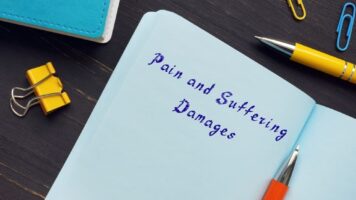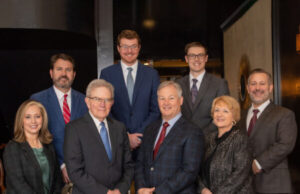A freight train barreling toward a crossing, with its unmistakable whistle blaring, should send a chill through anyone nearby. But imagine the unthinkable—your car is on the tracks, and there’s nowhere to go.
After a devastating collision with a freight train in Southeast Missouri, you need a personal injury lawyer who understands the legal steps that follow such a catastrophic event.
At Cook, Barkett, Ponder & Wolz, our experienced SEMO train accident lawyers know the unique challenges of handling train-related accidents. While freight train collisions may seem straightforward—after all, a train can’t swerve or stop quickly—these cases involve a complex web of state, federal, and local laws.
In Southeast Missouri, where train lines crisscross rural and urban areas, the risk of such accidents is very real. After a collision with a freight train, you need a legal team prepared to stand up to the entities involved, whether it’s a railroad company or an insurance carrier unwilling to offer fair compensation.
The Harsh Reality of Freight Train Collisions
Freight trains can weigh thousands of tons and travel at high speeds, creating immense force upon impact. According to the Federal Railroad Administration (FRA), a freight train traveling at 55 miles per hour can take over a mile to stop. Common outcomes when a car and train collide include severe injuries, extensive property damage, and, unfortunately, fatalities.
Missouri has an extensive freight rail network, with tracks spanning towns like Cape Girardeau, Sikeston, Scott City, and Poplar Bluff. The Union Pacific Railroad and the Burlington Northern Santa Fe Railway connect to Cape through the Semo Port.
Given the rural nature of much of the region, train crossings at intersections may not feature crossing arms, warning lights, or gates.
These crossings, known as passive crossings, rely solely on signs and pose particular dangers to drivers who don’t know the area or when visibility decreases due to weather or foliage.
Why Freight Train Accidents Happen
A lawyer who knows why train accidents occur can determine fault in your case. Freight train collisions can be caused by:
- Driver Error: Whether due to distraction, unfamiliarity with the area, or impatience, some drivers mistakenly believe they can beat a train or don’t realize the tracks are active.
- Faulty Warning Systems: In some cases, the lights, gates, or signals at a train crossing may malfunction, failing to alert drivers of an oncoming train.
- Poorly Maintained Crossings: Many crossings are passive crossings lacking modern safety features. In rural areas, where train traffic may be sparse, these crossings might not receive the same attention or maintenance as those in more populated areas.
- Negligence of the Train Operator or Railroad Company: Freight trains are controlled by complex systems that require constant communication and coordination. Operator negligence, failure to properly maintain the train or tracks, or communication breakdowns between railroad personnel can all contribute to a collision.
If any of these factors played a role in your accident, you may hold the railroad company or another party accountable. However, you will need legal assistance to prove these cases.
At Cook, Barkett, Ponder & Wolz, we understand the complexities involved in train collision cases, and our SEMO train accident attorneys will gather the evidence needed to build a strong case.
Laws Governing Train Crossings
Train accidents are unique because they often involve state and federal laws. Missouri law governs the safety of crossings, while federal law regulates train operations. Under the Federal Railroad Safety Act (FRSA), railroads must follow specific safety standards regarding the maintenance of tracks, the operation of trains, and the signaling systems at crossings.
The Missouri Department of Transportation (MoDOT) also has railroad safety regulations to ensure the safety of crossings for drivers and pedestrians.
Freight trains are regulated by state and federal laws and agreements between local governments and railroad companies. These agreements may dictate the maintenance of crossings, the installation of safety features, and the overall safety of railroad operations in specific areas.
Additionally, under Missouri’s comparative negligence laws, if a driver is found partially at fault for an accident (for instance, if they ignored warning signals or tried to cross when it was unsafe), their compensation may be reduced by the percentage of fault attributed to them.
When an accident occurs, investigating the role of each entity is a significant part of any legal case.
Potential Claims After a Freight Train Collision
If a collision with a freight train injures you or a loved one, you may pursue several claims for:
- Personal Injury Claims: If you were injured in a train collision, you may be entitled to compensation for medical expenses, lost wages, pain and suffering, and more. Proving liability in these cases often requires extensive investigation, including reviewing maintenance records, signal operations, and the actions of the train operator at the time of the accident.
- Wrongful Death Claims: Tragically, train accidents often result in fatalities. If you’ve lost a loved one in a train collision, you may be able to file a wrongful death claim. These cases can provide compensation for funeral expenses, loss of financial support, and the emotional trauma of losing a family member.
- Property Damage Claims: While personal injury is the most significant concern after a train accident, damage to your vehicle can also be extensive. You may be able to recover compensation for the cost of repairs or the replacement value of your car if it was destroyed in the collision.
How Long Do I Have to File a Claim?
Missouri law imposes statutes of limitations on train accident cases for personal injury, property damage, and wrongful death. You may lose your right to file a lawsuit if you miss these deadlines.
- Personal Injury: Missouri has a five-year statute of limitations for personal injury claims. This means you must file a lawsuit within five years from the date of the accident or injury. This time frame applies to cases involving injuries sustained in a train accident, whether you were in a vehicle hit by the train or injured as a pedestrian.
- Property Damage: If your vehicle or other property was damaged in a train accident, Missouri law also gives you five years to file a claim for property damage. This statute begins running from the date the damage occurred.
- Wrongful Death: For wrongful death claims, Missouri’s statute of limitations is three years from the date of the person’s death. If you lost a loved one in a train accident, you must file your wrongful death lawsuit within this three-year period to preserve your right to seek compensation.
Exceptions or Extensions
In some cases, exceptions to these time limits may apply, such as if the injured person is a minor or if the defendant acted in a fraudulent way to conceal the cause of action. Always consult a lawyer as soon as possible so you don’t miss the deadline.
At Cook, Barkett, Ponder & Wolz, our SEMO personal injury lawyers can help you understand which deadlines apply to your specific situation and guide you through the legal process.
Next Steps After a Train Collision: Filing a Lawsuit
If you have already left the scene of a train collision or lost a loved one in a train crash, take legal action to protect your rights and seek compensation for your loss. Whether you were directly involved or grieving the loss of someone close to you, it’s normal to feel uncertain about the legal process.
Even if you weren’t present at the scene, we can still build a strong case for you.
At Cook, Barkett, Ponder & Wolz, we encourage you to reach out as soon as possible. Our SEMO personal injury attorneys can guide you through the process and ensure you understand your options.
It’s never too late to consult a lawyer. Even if you missed documenting the scene or other immediate steps, we can still gather evidence and investigate the crash.
How to Prepare for Your Free Consultation
We understand that a lawsuit may feel overwhelming, especially when you are still processing the emotional and physical trauma of a train accident. However, the first step—speaking to a lawyer—is simple, and our team is here to make it as stress-free as possible.
When you schedule a free consultation with our personal injury law firm, we’ll take the time to listen to your story, explain your legal rights, and answer any questions you may have. While we don’t expect you to have all the answers or documentation immediately, bringing certain materials to your initial meeting can help us assess your case more thoroughly. Some helpful items include:
- Police Report: If law enforcement came to the scene, the police report often includes important details about the crash, including witness statements and any citations issued.
- Medical Records: If you or your loved one received medical treatment after the accident, bring any medical records, including bills, diagnosis notes, and treatment plans. These documents will help us understand the severity of injuries sustained.
- Insurance Information: Any correspondence with your or your loved one’s insurance company or the railroad’s insurance is valuable. Bring copies of letters, emails, and any other documents related to claims.
- Witness Information: If you know of anyone who witnessed the accident, having their contact information available can help as we gather evidence.
- Photos and Videos: If you or others took photos or videos of the accident scene, train crossing, or damage, they can be useful in building your case.
We understand that you may not have all of this information readily available, and that’s okay. Our attorneys will work diligently to uncover all the details surrounding your case.
During your consultation, we will discuss the details of the accident or loss, explore potential legal options, and explain the next steps if you decide to pursue a claim.
This initial meeting is free, and there’s no obligation to hire us afterward. It’s a chance for you to get to know our team, ask questions, and decide if you feel comfortable moving forward with your case.
Contingency Fees: You Can Afford a Lawyer
A big concern people have when considering legal action is cost. At Cook, Barkett, Ponder & Wolz, we work on a contingency fee basis, which means you don’t pay any upfront legal fees. We only get paid if we successfully recover compensation for you.
Our fees are taken as a percentage of the settlement or verdict, so there’s no financial risk to you in pursuing a claim. This fee structure ensures that everyone can access high-quality legal representation regardless of financial situation.
How Our Train Accident Lawyers Can Help
Our trial lawyers at Cook, Barkett, Ponder & Wolz are skilled at handling these tough cases. We understand the impact these accidents can have on you and your family, and we’re here to fight for the compensation you deserve.
Gathering Evidence for Your Case
After a freight train accident, collecting and preserving evidence is essential to building a strong case. Train companies and their insurers will often have teams of lawyers and investigators ready to minimize their liability, so having an experienced legal team on your side is important to counter their efforts.
Key evidence in a train accident case may include:
- Train and Crossing Maintenance Records: These documents can show whether the railroad company properly maintained its trains and crossings. If safety features at the crossing were broken or improperly maintained, this could point to negligence on the part of the railroad company.
- Surveillance Footage or Dashcam Video: Most trains are equipped with cameras that record the tracks on which they are operating, In addition, train crossings may be equipped with cameras that can capture footage of the accident. Additionally, dashcam footage from your vehicle or other witnesses can help show what happened before the collision.
- Eyewitness Testimony: If there were any witnesses to the accident, their testimony can be valuable in determining how the collision occurred.
- Signal and Communication Logs: Freight trains rely on a network of signals and communication systems to operate safely. Reviewing these records can help determine whether a signal failure or miscommunication contributed to the accident.
By thoroughly investigating your case and gathering all available evidence, we can help build a strong case to hold the responsible parties accountable.
Negotiation and Litigation
Our team doesn’t just collect evidence—we provide comprehensive legal support from start to finish.
Beyond investigating the case, our lawyers can assist in other key areas, such as:
- Negotiating with the Railroad: Railroads often try to minimize payouts after serious accidents. We’ll negotiate with them to seek a fair settlement that reflects the full extent of your injuries and losses. We are prepared to go to trial if they refuse a fair settlement.
- Filing Legal Claims: Whether it’s a personal injury claim or a wrongful death lawsuit, we’ll guide you through the legal process and ensure all claims are filed within Missouri’s statutes of limitations.
- Representing You in Court: We have the experience and resources to take your case to court. Our trial lawyers are not afraid to litigate, and we’ll advocate for your rights before a judge and jury.
- Keeping You Informed: Legal proceedings can be confusing, but we’ll explain everything to you clearly and keep you updated at every stage of your case.
Contact Cook, Barkett, Ponder & Wolz for Help
A collision with a freight train is a terrifying experience, and the aftermath can be just as overwhelming. In Southeastern Missouri, where train crossings are common and safety measures can sometimes fall short, freight train accidents present unique legal challenges.
At Cook, Barkett, Ponder & Wolz, our trial lawyers are prepared to take on these tough cases, fighting for the compensation you need to move forward. Whether you’re dealing with severe injuries, the loss of a loved one, or property damage, we’re here to help you navigate the legal system and hold the responsible parties accountable.
If you or a loved one has been involved in a freight train collision in Cape Girardeau, Sikeston, Scott City, Poplar Bluff, or anywhere in Southeast Missouri, don’t hesitate to reach out.
Our office is conveniently located across from the Osage Center and northwest of Southeast Missouri State University, and we’re ready to help you seek justice. Call our Cape Girardeau office at (573) 335-6651 or contact us online now.




